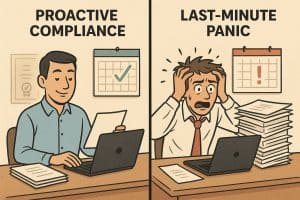Physical Address
5206 Hwy 5 N Suite 100, Bryant, AR, United States, Arkansas
Physical Address
5206 Hwy 5 N Suite 100, Bryant, AR, United States, Arkansas

Landlord W-9 compliance is one of the most overlooked parts of rental property management. If you hire independent contractors like repair workers, gardeners, or handymen for your rental business and pay them $600 or more in a year, you must file a Form 1099-NEC with the IRS and provide a copy to the contractor.
The only way to do this correctly is by collecting a signed IRS Form W-9 from each contractor before you pay them. Failing to collect W-9s early often leads to last-minute panic at tax season, missed deductions, and even IRS penalties.
The IRS requires landlords and small business owners to file 1099-NECs for contractors earning $600+ annually. Without a W-9 on file, you may:
👉 Related: Are You Filing W-9s Wrong? Find Out
It’s common to hire a repair person early in the year for a $200 job. Later, you use them again for larger work, and by December your total paid exceeds $600. If you didn’t collect a W-9 upfront, you’re scrambling to find them at year-end—when many don’t return calls or emails.
That’s why best practice is to request a W-9 the first time you engage any contractor or service provider.
IRS Form W-9 (Request for Taxpayer Identification Number and Certification) allows you to:
The IRS expects you to retain W-9s for at least 3–4 years for audit readiness.
Q1. Do landlords need a W-9 from every contractor?
Yes, if you expect to pay them $600 or more in a calendar year and they are not incorporated.
Q2. What happens if I don’t collect a W-9?
You may lose your deduction for payments, be required to withhold 24% (backup withholding), or face penalties at tax time.
Q3. Should I collect W-9s from corporations?
Generally no, but certain corporations (e.g., attorneys) still require reporting.
Q4. When is the best time to collect W-9s?
Immediately—before or at the first payment. It avoids year-end stress.
For landlords, W-9s aren’t optional they’re essential. By collecting W-9s from contractors at the start, you avoid last-minute panic, protect your deductions, and stay compliant with IRS rules.
👉 Don’t wait until January. Automate W-9 collection today with GetW9 and focus on managing your rentals not chasing paperwork.